- Algrano is showcasing coffees from a science-driven exporter and a small cooperative in the mountains of Espírito Santo. These are relationships that go way back and now the logistics are in place to make market access happen.
- Our supply chain focuses on the South of Espírito Santo, where the coffee sector is made of farms with 5,4 hectares on average. Picking is often manual and they rely on family labour.
- Conilon, similar to Robusta, has been produced in the state since the 1970s. Whilst it used to be dried for only six hours - hence the poor quality - producers now improved their picking of ripe cherries and started drying their coffee more gently, for longer periods of time.
- Quality has changed dramatically in the last 15 years. The South’s sensory profile presents notes of chocolate, caramel, sugar cane and nuts with a velvety body and a long finish with no harshness.
A Brazilian Coffee Close to Our Roots
Providing market access to family farms from Espírito Santo, Brazil, was something Algrano’s has been striving to do since 2015.
The South of the state, which borders Rio de Janeiro and Minas Gerais, is a mountainous area with a variety of micro-climates that yield a wide range of interesting flavour profiles.
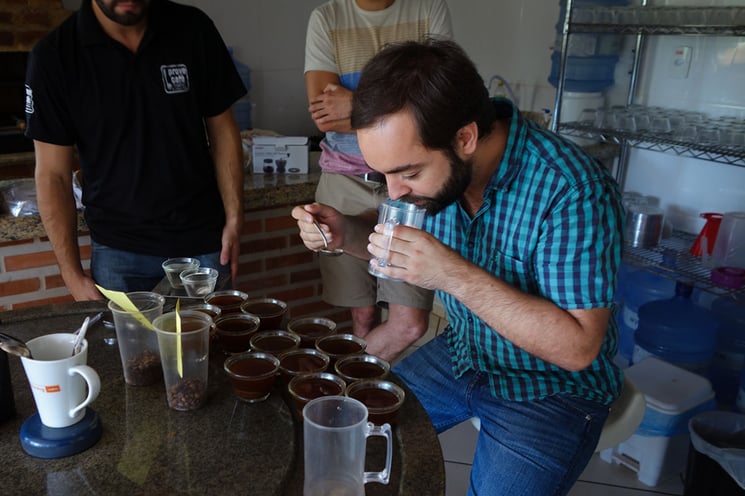 Co-founder Gilles Brunner in Venda Nova do Imigrante in 2015 (Photo: Algrano)
Co-founder Gilles Brunner in Venda Nova do Imigrante in 2015 (Photo: Algrano)
Algrano’s founders also lived in Espírito Santo in 2015. They spent one year there working on research and development of the platform, visiting producers from their base in the coastal town of Vitória, home to the main export port of the region.
One of our first campaigns in 2016 promoted coffees from the highland region of Espírito Santo, around the municipalities of Venda Nova do Imigrante and Castelo, showcasing micro-lots from farms of 10 or 20 hectares.
Logistics was tricky. We had to send coffee to Minas Gerais to be exported via Santos with support from Sancoffee, one of our oldest export partners. We also relied on a freelance exporter/consolidator, who decided to stop after the first year.
Rekindling Old Relationships
But coffee is a people’s business and some of the relationships we developed at the time carried on. A group of farmers remained registered on the platform. One of them is Dério Brioschi Junior, son of Dério Brioschi, owner of Sítio dos Cedros.
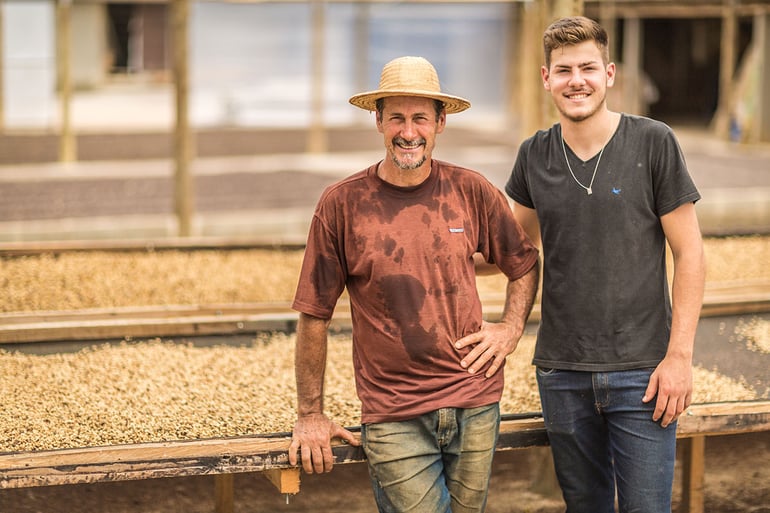
Dério Brioschi, father, and Philipe Brioschi at Sítio dos Cedros in 2015 (Photo: Algrano)
Back in 2016, Dério helped with the procurement and shipment of the coffees. He was only 16. Dério later went to university to study Food Science and Technology at Instituto Federal do Espírito Santo.
There, he learned from Professor and Head of Coffee Design Lucas Louzada, a research leader in Brazil’s specialty sector, focusing on both Coffea arabica and Coffea canephora.
In 2019, having left university, Dério formed a coffee consultancy - Farmers Coffee - with his brother Philipe Brioschi and uni colleagues João Paulo Marcate and Luiz Henrique Pimenta, also sons of coffee farmers.
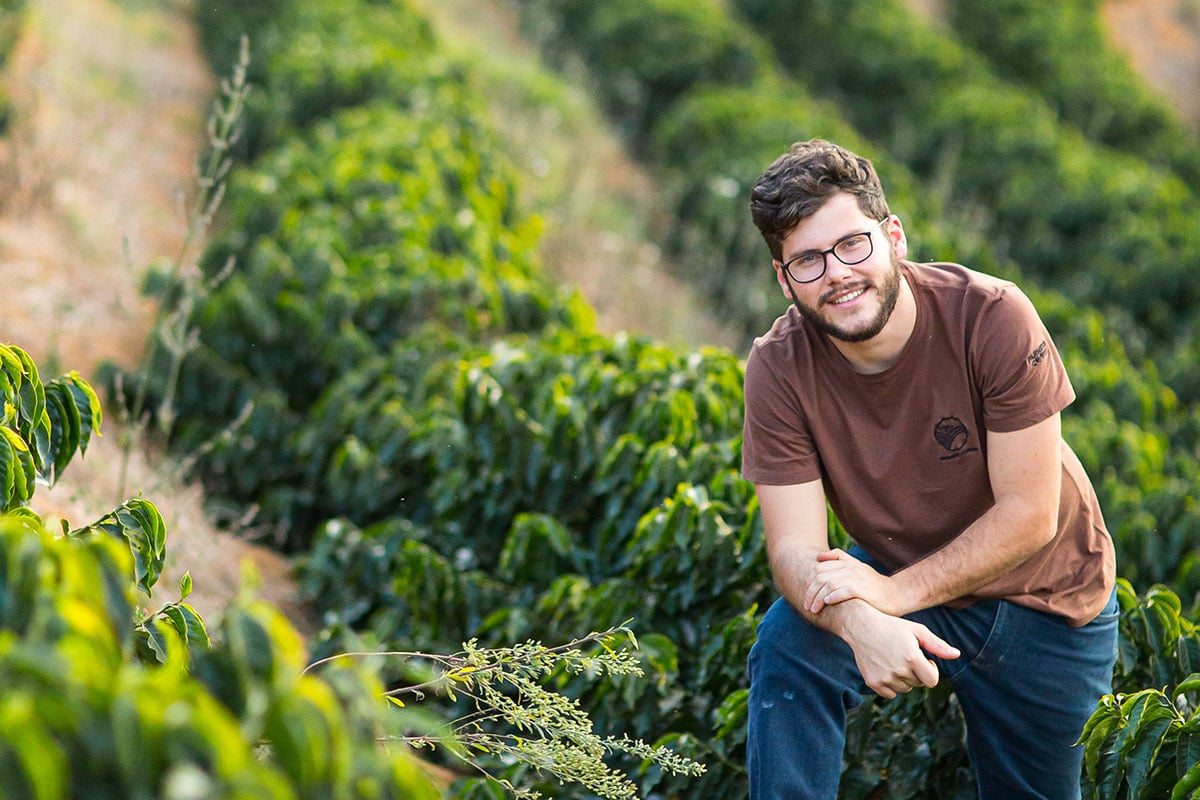
Dério Brioschi Jr today, seven years after discovering Algrano (Photo: Farmers Coffee)
The business went from an agronomy consultancy to a commercial operation in no time as the four partners began marketing the coffees produced by their parents.
As they got closer to more farmers through their services, they began offering brokerage and trading to producers beyond their family circle.
Now 23 and taking advantage of his previous experience, Dério was quick to jump back on the platform. And that’s one of the reasons why Espírito Santo is back on the menu for roasters.
But the coffees are not the same. Espírito Santo’s coffee sector has gone through a lot of change in the last ten years. The state already had amazing Arabica back in 2016. Now, it also produces fine Conilon, a subtype of the Coffea canephora species which is similar to Robusta.
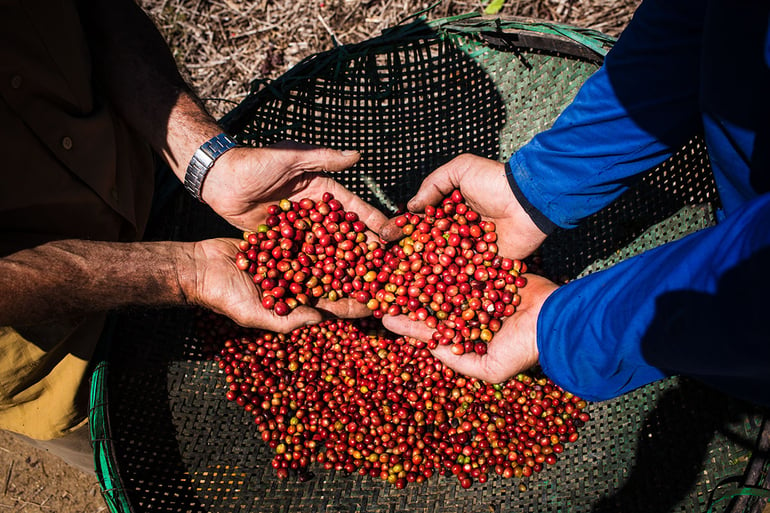
Conilon is Espírito Santo's main coffee. And it keeps getting better (Photo: Farmers Coffee)
From “Rio” to Specialty Conilon
Conilon has been the main product of Espírito Santo since the 1970s when producers started growing this coffee commercially. It presented better adaptability to the state’s warmer weather and yielded better than the ageing Arabica trees.
But fine or specialty Conilon has only gained traction in the last ten, and mainly the last five, years. The general reputation of Robustas for bad quality kept artisanal roasters away from this coffee until very recently.
It didn’t help that Espírito Santo’s main export is a type of quality called “Rio”, named after the port of Rio de Janeiro, which used to be where this type of coffee shipped from.
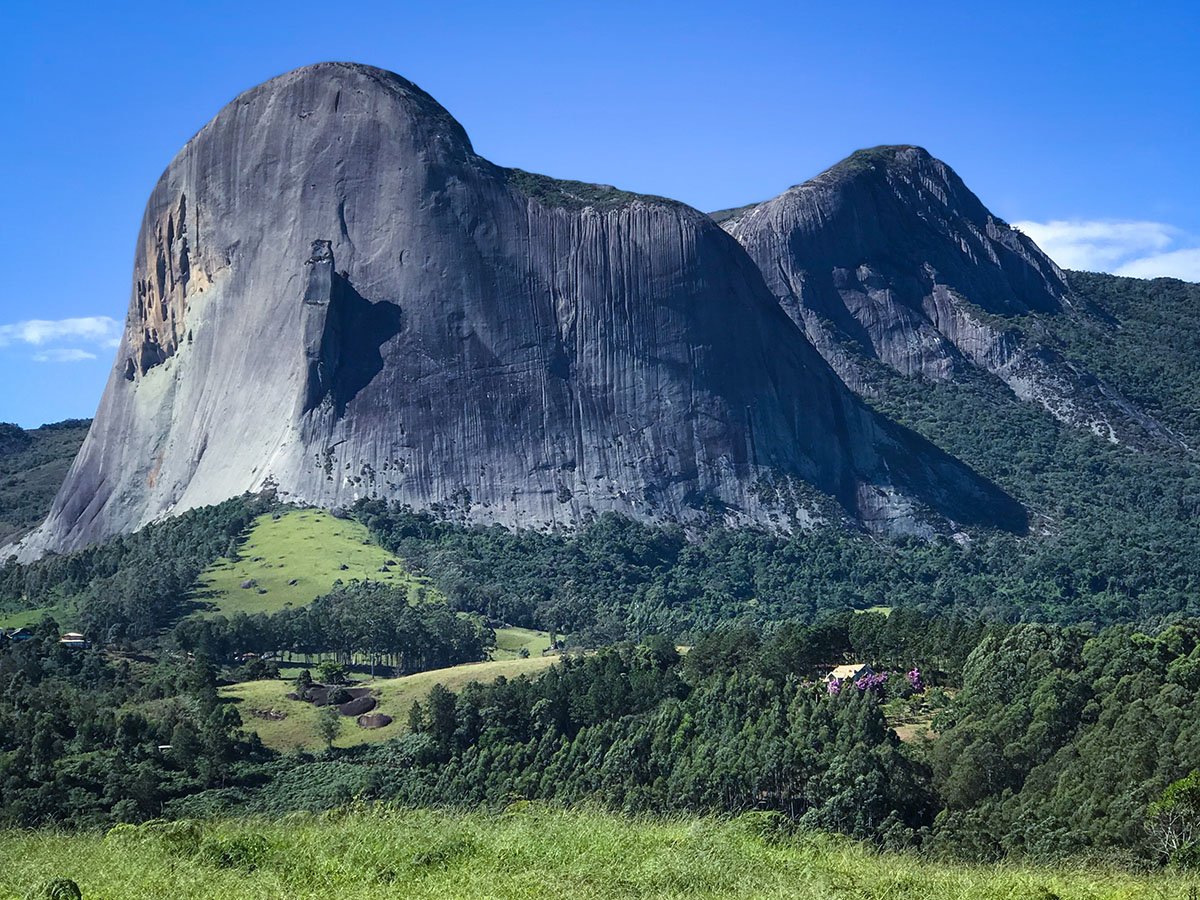
Pedra Azul, one of main landmarks of the South of Espírito Santo (Photo: Farmers Coffee)
Rio is a category or standard defined by COB, the official Brazilian classification system, that stands for coffee with a phenolic character due to unchecked fermentation on the patio.
As far as commodity Conilon goes, the region’s Rio is of reputable quality and consistency. It’s milder or “softer” than the same quality produced in other states. For decades, it’s been loved in Arab countries, an important destination for this coffee.
Better Picking, Processing and Sorting
Quality has been improving dramatically thanks to the support of companies like Farmers Coffee and the presence of small cooperatives like Cafesul, also offering Conilon on Algrano this year. The two organisations have been working on improving productivity (so farms can become profitable), sorting and post-harvest.
The result is a much cleaner profile without Conilon’s characteristic harshness, usually a result of poor sorting. You can also taste chocolate and caramel instead of the traditional woodiness. Producers have also been investing in fermentation techniques for micro-lots, resulting in coffees with fruity profiles, more perceived sweetness and acidity.
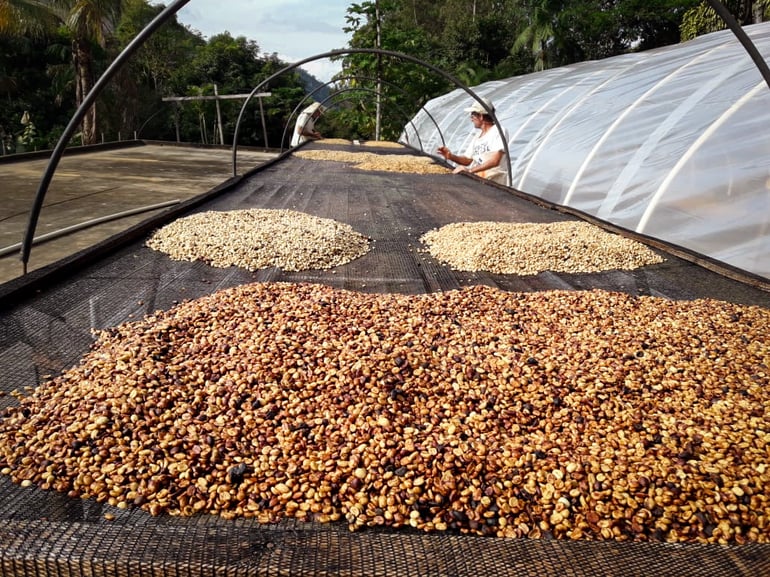 Conilon being processed on raised beds by a member of Cafesul (Photo: Cafesul)
Conilon being processed on raised beds by a member of Cafesul (Photo: Cafesul)
This year, demand for Conilon from Espírito Santo has risen to unprecedented levels due to Vietnam’s small crop and the potential impacts of El Niño, and word about the region’s quality is spreading.
Current demand might be a temporary lucky spell, but there are indicators that Robusta is having a moment. And if consumers take to it, roasters will continue to explore this subtype of Canephora for both price and diversity.
Farmers Coffee’s Operation
The exporters have a strong base in agronomy and post-harvest. They provide tailored support on farming practices and processing to more than 300 families in the mountains of Espírito Santo. Because of this work, they have a deep understanding of the coffees they offer and good relationships with the people who produce them.
Producers are under no obligation to sell coffee to Dério’s team, but they are regularly approached by their network to get sales support for Arabica and Conilon, commodity grade and specialty.
Farmers Coffee also have a warehouse and dry mill where they can prepare coffee according to international standards - they work with both Conilon and Arabica, which they'll also offer on the marketplace.
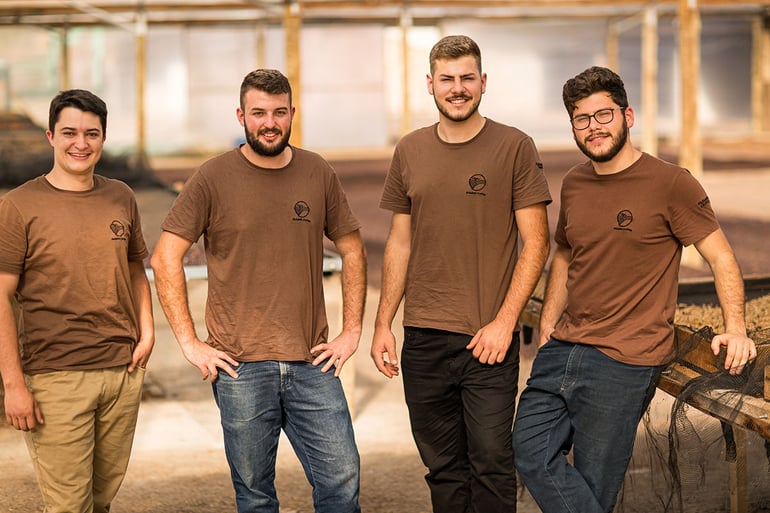
Farmers Coffee team: Luiz Henrique, João Paulo, Phelipe & Dério (Photo: Farmers Coffee)
Farmers Coffee’s young team specialises in more than coffee processing. Dério is a certified Q-grader and official BSCA (Brazilian Specialty Coffee Association) taster. He was a Cup of Excellence juror in 2021 and 2022.
João Paulo and Luis Henrique are also Q-graders. The first dedicates time to roasting specialty coffee, including roast profiling for Conilon. And Luis manages a Cup of Excellence-winning farm.
Cafesul’s Operation
Cafesul (Cooperativa dos Cafeicultores do Sul do Estado do Espírito Santo) first got to Algrano in 2020 through Fairtrade’s network in Brazil. One of their members, Luiz Claudio de Souza, was one of the Taza Dorada winners - and we got to try the samples.
The cooperative, founded in 1998, has been winning national awards since 2018. Their quality and Fairtrade certification are two big differentiators for the organisation, allowing them to compete in a region where large cooperatives could easily swallow them.
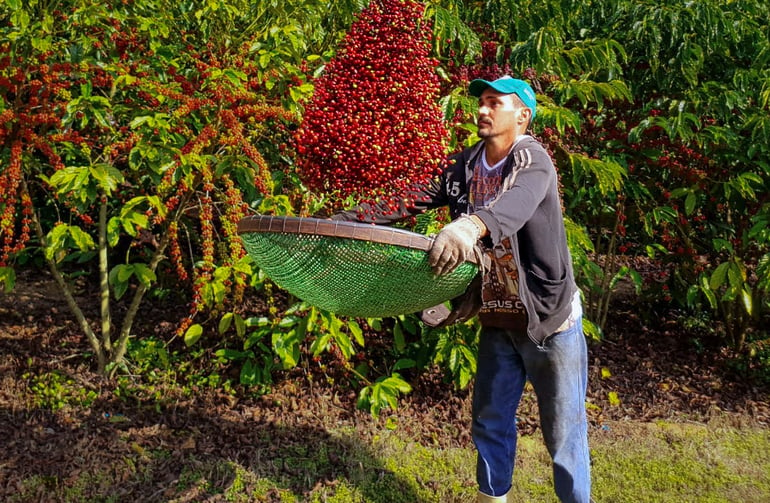
A small coop, Cafesul invests in quality and certifications to stand out (Photo: Cafesul)
Cafesul has 180 members in seven municipalities in the South of Espírito Santo, all neighbouring their base in the town of Muqui. Farms have an average size of 5,4 hectares with good productivity. Together, they produce up to 30 thousand bags of Conilon per year, and 100% of the coffee is Fairtrade.
Talles da Silva de Souza, Cafesul’s Operational Manager, estimates that only 10% of their production corresponds to fine or specialty Conilon, but the farmers have the right profile and conditions for quality. Many of them grow coffee in areas where there used to be Arabica plants.
Conilon Production in Espírito Santo
Conilon’s culture in Espírito Santo is hundreds of years old and many local towns developed because of coffee production. Historically, there has also been a North and South divide in the state.
Traditionally, the North stood out for being highly mechanised and productive. There is a large number of big highly productive enterprise-like farms with a focus on volume and operational innovation.
The area is typically lower in altitude and flatter. The sensory profile is clean, but the North’s Conilon tends to be dryer and woodier.
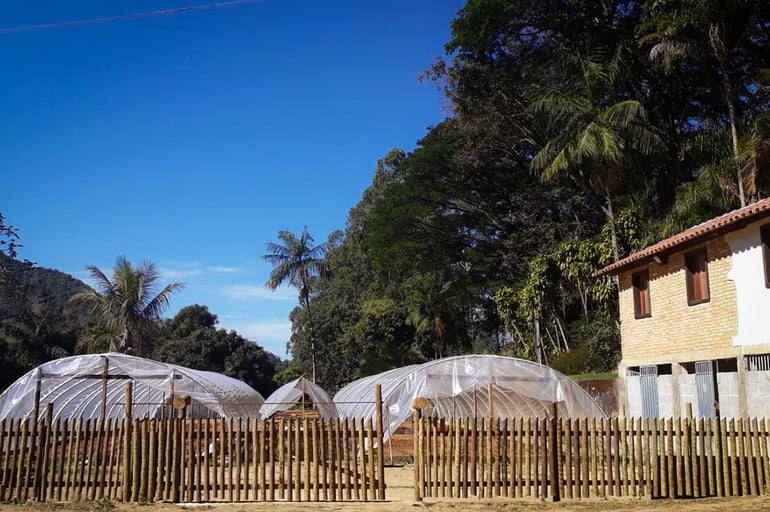 The South is made of small family farms in mountainous areas (Photo: Cafesul)
The South is made of small family farms in mountainous areas (Photo: Cafesul)
Due to a lack of investment in research and production, the South has lagged behind the North when it comes to technology. The size of the farms also means it’s harder to apply efficiencies of scale. This has changed in the last 15 years, with the introduction of new technologies and irrigation.
The South stands out for the quality produced by small families. The topography is curious. Farms spam areas right next to the beach (we’re talking 17 masl) to mountains at 750 masl. All plots are marked by hills and inclinations, making it difficult to mechanise production, so most producers rely on family labour.
To give you an idea of scale, Northern farms tend to have an output of around 10,000 bags per year, whilst Southern farms produce anything between 50 and 200 bags on average.
When it comes to flavour, the South presents more defined notes of chocolate, caramel, sugar cane and nuts with a velvety body and a long finish without harshness or bitterness.
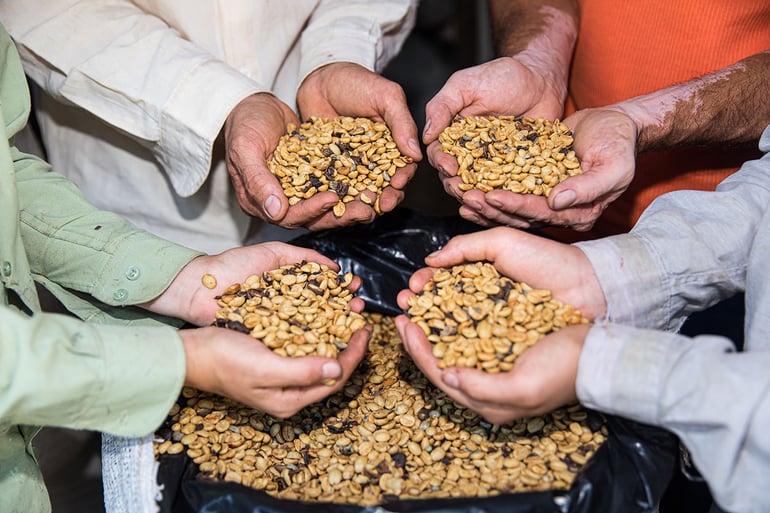
Most coffees are processed as Pulp Naturals due to the local climate being rainier and more humid than in Minas Gerais (Photo: Cesconetto family by Farmers Coffee)
Today’s quality is a result of the adoption of Arabica processing practices by Conilon producers. The coffee has come a long way from the Conilon Types 7 or 8 standards, usually sold in the internal market and used for soluble coffee due to a high number of defects.
This type of coffee used to be dried for only six hours before storage. But producers have improved their picking to focus on ripe cherries and started drying their coffee more gently, for longer periods of time.
Most coffees will be processed as Pulped Naturals due to the humid climate, similar to Colombia or Central America. This method reduces the chances of coffee being spoilt by fermentation. Small farms have also started making Natural micro-lots fully sun-dried on patios.
Espírito Santo Conilon on Algrano
Peak harvest: April - August
Offer period: July - August
Shipment: October - December
Warehouse release: January 2023

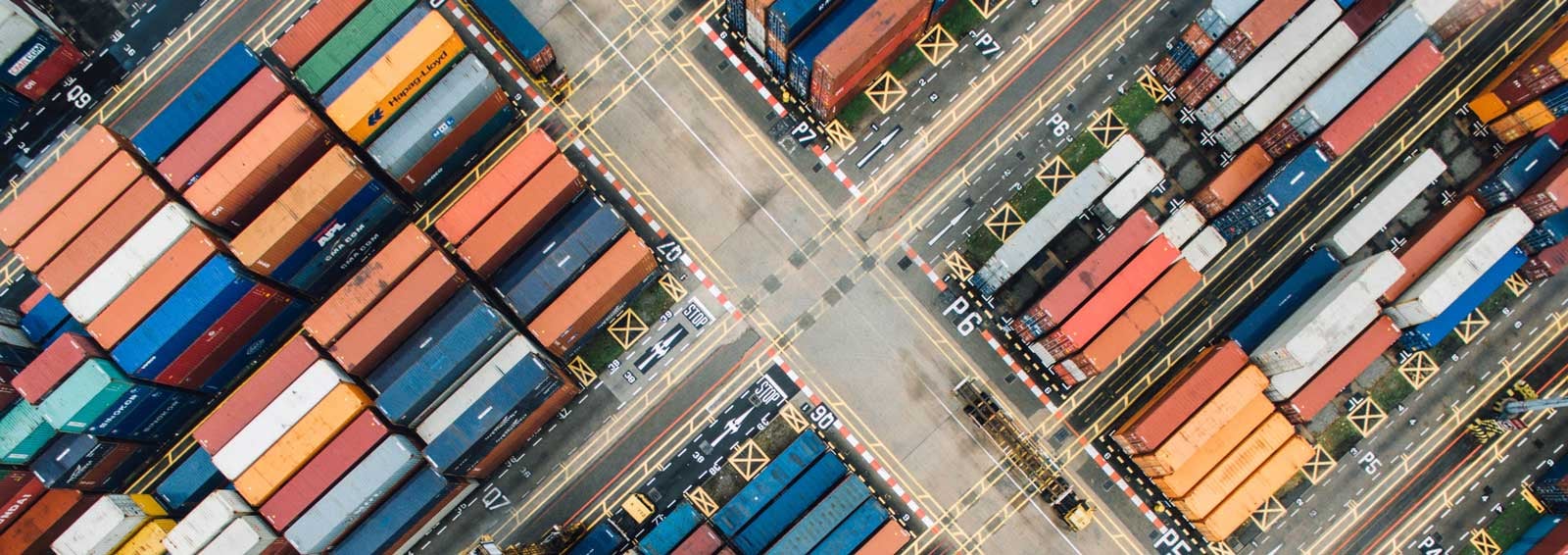


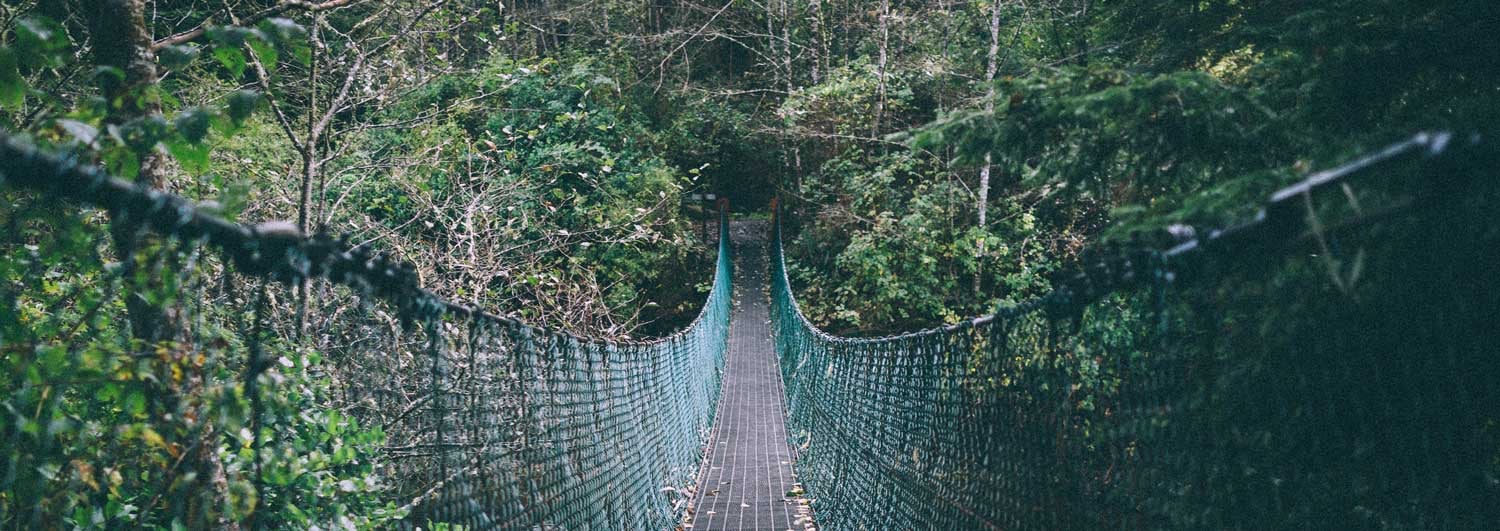

Let Us Know What You Thought about this Post.
Put your Comment Below.